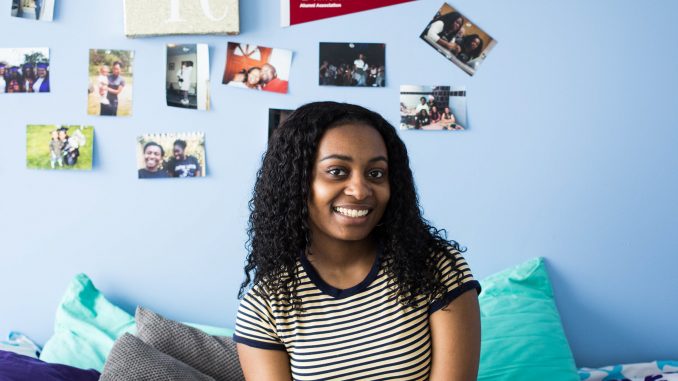
The day before her birthday this year, Kylie Webster-Cazeau found out she and her best friend were named 2016 Bostonians of the Year when she read an article in the Boston Globe.
“It kind of felt surreal,” Webster-Cazeau said. “It was this thing that blew up and everyone kept texting and calling and congratulating me, but it never really felt real.”
Webster-Cazeau, a freshman sociology major, received the award with Meggie Noel, her friend from Boston Latin School — a public community school they attended together. Both of the girls noticed that racism among their classmates at their school was not being dealt with, and they fought to make their school a welcoming place for people of color.
It started when Webster-Cazeau and Noel were sophomores in high school. After the death of Michael Brown — an unarmed 18 year old from Ferguson, Missouri who was killed by police officer Darren Wilson — the two noticed their classmates posting racist tweets.

“It got really graphic,” Webster-Cazeau said. “Students telling other students, ‘Go back to Africa,’ or ‘We should have never bought you’ or students telling other students that if they were at the protests, they would’ve shot them.”
At the time, the girls were both part of the group Black Leaders Aspiring for Change and Knowledge, and Noel was the president. She printed out all the racist social media posts and put them into a blue binder to give to administration.
Noel and Webster-Cazeau wanted the headmaster of BLS to reprimand the students who wrote the racist tweets, so that students of color at the school could feel comfortable that something like that would not happen again.
The headmaster of BLS told Noel that she agreed something must be done, but after 18 months, the school failed to address the situation, Webster-Cazeau said.
“We noticed that things started to get worse,” said Webster-Cazeau of the racism at BLS. She added that a white student screamed at a student of color, saying they should be lynched.
The two girls, who were then seniors, decided to get the word out about racial issues that had continued at the school.
“We were like, ‘We shouldn’t have to go through this, like, why are we so stressed?’ Our school should support us, they shouldn’t make us feel like we’re [dispensable,]” Webster-Cazeau said.
In January 2016, they uploaded the first video of a campaign called #BLACKAtBLS to YouTube. In the video, Webster-Cazeau and Noel said they refuse to go unacknowledged as Black students and will continue to try to unite their community.
“We are here today to make our voices heard and to show BLS administration and everyone that we refuse to be silenced and we’re not afraid to speak up,” Noel said in the video.
The video got thousands of views in less than 24 hours and hundreds of students used the hashtag to share their stories of being Black at BLS. This led to the investigation of the Boston public schools and their lack of action against student racism. There was also forums created for parents and students to talk about these issues, as well as the creation of a Black parent council and a Black alumni coalition at BLS.
“When we first started B.L.A.C.K. at BLS and the movement, we didn’t really expect much to come out of it, but so much did,” Webster-Cazeau said.
Martin J. Walsh, the mayor of Boston, met with the duo in June 2016 and after, Webster-Cazeau said, Mayor Walsh started conversations about race in the city. According to a Boston Globe article, he was inspired by a woman who asked him if he thought Boston was a racist city.
The year-long series of racial discussions started in November 2016 and includes elected officials, community representatives, parents and students coming together to talk freely about racism in Boston.
At Temple, Webster-Cazeau said she’s been having a better educational experience than she did in high school. She is currently a member of the university’s Black Student Union and the Student Organization for Caribbean Awareness’s club dance team.
“Before Temple, I didn’t enjoy going to school and at Temple I enjoy going to school,” Webster-Cazeau said. “It’s definitely a different experience to go to class and there’s at least one other person that looks like me, because I’d really go through my whole day at BLS and have no Black students in any of my classes.”
“It’s really reassuring to see Black students at Temple be successful and be a part of organizations and be in fraternities and sororities and be presidents of clubs,” Webster-Cazeau said. “It makes me feel better about being here.”
Taylor Horn can be reached at taylor.suzanne.horn@temple.edu.


Be the first to comment